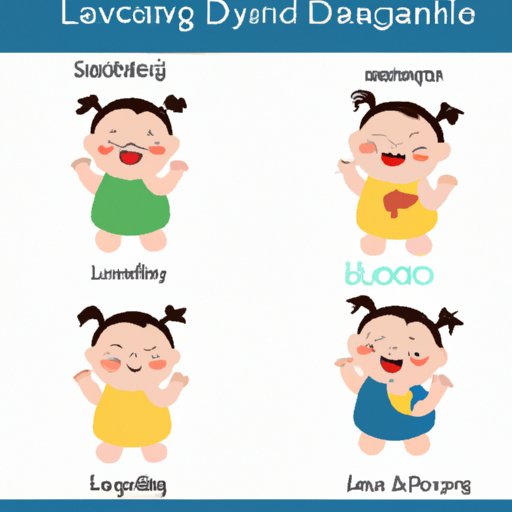Introduction
Language milestones are important indicators of a child’s development, as they are crucial for communication, socialization, and cognitive skills. Language development in children starts at a very young age and continues throughout their lifetime. As a parent, it’s important to understand and keep track of your child’s language milestones, especially during their toddler years. In this article, we’ll explore how many words should a 2-year-old know and provide tips for parents to encourage their child’s language development.
The Science of Language Development: How Many Words Should a 2-Year-Old Know?
Language development in toddlers is a complex process that includes various milestones. By the age of two, most children can express themselves with words, and their vocabulary should be growing steadily. On average, a 2-year-old should know around 50 words, including simple nouns, verbs, and adjectives.
However, it’s important to note that there is a wide range of what’s considered typical for language development in children. Some may develop language skills at a faster rate, while others may lag behind.
Delayed language development is not uncommon, and it may be caused by various factors, including hearing problems, developmental disorders, or a lack of exposure to language. If you’re concerned about your child’s language skills, it’s essential to consult with a pediatrician or a speech-language pathologist to determine whether intervention is necessary.
Tracking Toddler Talk: A Guide to Language Milestones for 2-Year-Olds
It can be helpful to understand the typical language milestones for 2-year-olds to track your child’s language development. Here are some typical language milestones for 2-year-olds:
- Says simple nouns and verbs, such as “ball” and “go”
- Uses pronouns, such as “I,” “you,” and “me”
- Begins to use two-word phrases, such as “big dog” or “daddy up”
- Is able to follow simple commands, such as “sit down” or “come here”
- Points to objects when they are named
- Understands basic concepts, such as “in” or “on”
If your child is not reaching these milestones, it’s possible they may have a language delay. It’s important to consult with a pediatrician or a speech-language pathologist to determine whether intervention is necessary.
Speech and Language Tips for 2-Year-Olds: How Many Words is Typical?
As a parent, you play a crucial role in your child’s language development. Here are some tips for promoting vocabulary growth:
- Talk to your child as much as possible, using simple words and phrases
- Read books to your child daily
- Sing songs and play word games together
- Encourage your child to imitate sounds and words you say
- Repeat and expand on your child’s words and phrases during conversations
There are many reasons why a child may have speech and language delays, including hearing loss, developmental delays, and exposure to a limited language environment. If you’re concerned about your child’s language development, consult with a pediatrician or a speech-language pathologist for assessment and intervention.
From Mama to Marmalade: Understanding Your 2-Year-Old’s Growing Vocabulary
As children grow, their vocabulary continues to expand. Children learn new words by hearing them in everyday conversations, books, songs, and media. They also learn to use language to communicate with others, express their needs and wants, and make social connections with peers and caregivers.
Children also learn through play and exploration. For example, they may learn the names of different fruits and vegetables by helping their parents with cooking or grocery shopping. It’s important to follow your child’s lead during conversations and provide plenty of opportunities for them to practice and use new words.
The Importance of Early Language Development: How Many Words Should Your 2-Year-Old Know?
Early language development is crucial for your child’s cognitive, social, and emotional development. Children who have strong language skills are better equipped to understand and express their thoughts and feelings, establish positive relationships, and succeed academically and professionally later in life.
Research has also shown that children who have delayed language skills may be at risk for later academic and developmental problems. Early intervention is essential for addressing language delays and ensuring that children have the best possible outcomes.
Boosting Your Toddler’s Language Skills: How to Increase the Number of Words Your 2-Year-Old Knows
Here are some strategies for parents to encourage language skills at home:
- Engage in frequent conversations with your child
- Read books together every day
- Sing songs and recite nursery rhymes together
- Encourage your child to participate in everyday activities, such as cooking or grocery shopping, and talk about what you’re doing
- Provide a language-rich environment, with plenty of opportunities for your child to hear and use new words
Remember that every child develops at their own pace, and there’s a wide range of what’s considered typical for language development. If you’re concerned about your child’s language skills, consult with a pediatrician or a speech-language pathologist for assessment and intervention.
Conclusion
Language development is a critical factor in your child’s overall development and success. As a parent, you can play an essential role in promoting your child’s language skills by engaging in frequent conversations, reading books, and providing a language-rich environment. If you’re concerned about your child’s language development, it’s important to consult with a pediatrician or a speech-language pathologist for assessment and intervention. Remember, every child develops at their own pace, and with the right support, your child can succeed.
